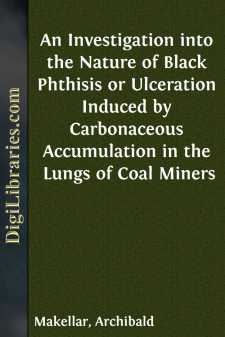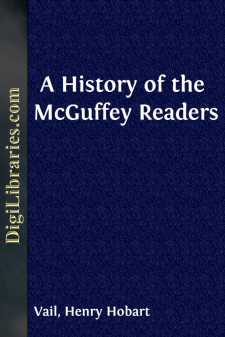Non-Classifiable
- Non-Classifiable 1768
Non-Classifiable Books
Sort by:
The notes on Sculpture. Compared with the mass of manuscript treating of Painting, a very small number of passages bearing on the practice and methods of Sculpture are to be found scattered through the note books; these are here given at the beginning of this section (Nos. 706-709). There is less cause for surprise at finding that the equestrian statue of Francesco Sforza is only incidentally spoken...
more...
PREFACE. An abstract of the investigations into the nature of carbonaceous infiltration into the pulmonary tissues of coal miners, was read by Dr Makellar at a meeting of the Medico-Chirurgical Society of Edinburgh, Wednesday, 8th July, 1845, Dr Gairdner, President, in the Chair. Reference was made, in particular, to the East Lothian coal-miners. The carbonaceous disease described, was stated to be...
more...
MIND AND MOTION [REDE LECTURE, 1885.] The earliest writer who deserves to be called a psychologist is Hobbes; and if we consider the time when he wrote, we cannot fail to be surprised at what I may term his prevision of the most important results which have now been established by science. He was the first clearly to sound the note which has ever since constituted the bass, or fundamental tone, of...
more...
by:
Daniel Clark
INTRODUCTION. Considerable parts of this book have been written for the unlearned. For the scholarly reader such parts, of course, would be wholly superfluous; yet it is hoped that they to whom these are familiar will be patient in passing through them for the sake of others to whom they may be instructive. Other parts, again, it is believed, will be found new to the most of even educated minds. But...
more...
This is the old gentleman who used to walk in front of steam-driven carriages on the King's highway. He carried in his hand a red flag which he waved. This is the traction-engine which always came behind the old gentleman, and made such a dreadful noise. If the roads were good it could travel four miles in one hour. This is the old gentleman getting out of the way of a motor car. This is a Motor...
more...
by:
Charles Kingsley
LECTURE I.WESTMINSTER ABBEY. Reverence for age, at least so it has long seemed to me, reverence for age, I say, is a fair test of the vigour of youth; and, conversely, insolence toward the old and the past, whether in individuals or in nations, is a sign rather of weakness than of strength. And the cause, I think, is this. The rich and strong young natures, which feel themselves capable of original...
more...
Of the above list, twenty (distinguished by one cross) are in Yájnavalkya's list: seventeen of these are named by ParáÃ
âºara, viz. all except Yama, Brihaspati and Vyása, instead of whom he gives KaÃ
âºyapa, Gárgya and Prachetas: the Padma Puráá¹â¡a gives those named by Yájnavalkya, with the exception of Atri, and seventeen others, (distinguished by two crosses) three...
more...
by:
Sarah Tytler
CHAPTER I. SIXTY-THREE YEARS SINCE. The 24th of May, 1819, was a memorable and happy day for England, though like many such days, it was little noticed at the time. Sixty-three years since! Do many of us quite realise what England was like then; how much it differed from the England of to-day, even though some of us have lived as many years? It is worth while devoting a chapter to an attempt to recall...
more...
by:
Edith A. How
1. The Country and its River Egypt is a country in the north of Africa. It has sea to the north and sea to the east. On the north it is called the Mediterranean Sea, and on the east the Red Sea. On the west is the great sandy desert called the Sahara, and to the south are great forests and mountains. Egypt itself is the land of the great River Nile. There is very seldom any rain there, and everyone has...
more...
A History of the McGuffey Readers THE BOOKS. Before me are four small books roughly bound in boards, the sides covered with paper. On the reverse of the title pages, two bear a copyright entry in the year 1836; the others were entered in 1837. They are the earliest editions of McGuffey's Eclectic Readers that have been found in a search lasting forty years. They represent the first efforts in an...
more...











